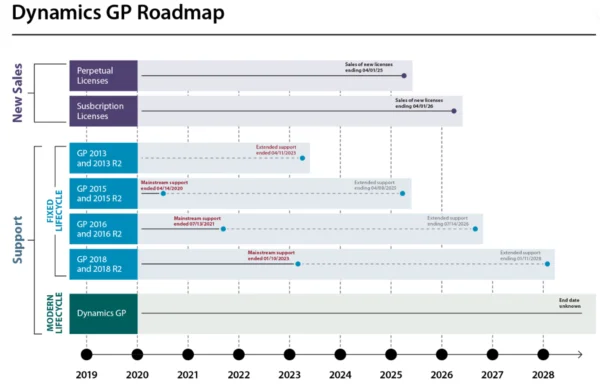Authored By: Jenny Tomlinson
Marketing Manager
As we look towards the future of enterprise resource planning (ERP), it’s clear that cloud-based solutions are becoming increasingly vital for businesses seeking agility, scalability, and continuous innovation. In the past year, Microsoft has announced a number of changes to the future of Dynamics GP and its impact on existing and new users.
This update didn’t really come as any great surprise as for some time now, many were asking questions around what Microsoft’s long-term plans were for the future of Dynamics GP, previously known as Great Plains.
Below is a summary of the key impacts of Dynamics GP for existing customers and any potential new customers.
What are the changes to new Dynamics GP Sales?
In April 2023, Microsoft announced there will be no new sales of Dynamics GP from 2026 onwards. It will be discontinuing the sale of new Dynamics GP licences and will be phasing this out over the next three years. Existing Dynamics GP customers will still be able to purchase additional users but there will be no new case Dynamics GP sales.
1st April 2025: New licencing for Dynamics GP will be Subscription-based only.
1st April 2026: New Customer sales for Dynamics GP is discontinued.
The good news is that Microsoft wants to focus most of its resources on other innovative ERP solutions and wants to make sure that new customers adopt systems that benefit from future innovations.

What are the changes to existing Dynamics GP users?
Microsoft is still committed to its ongoing maintenance and support plans for the Dynamics GP User base and is continuing support of Dynamics GP to 2028 in terms of a published roadmap. We are unable to confirm longer term plans beyond this and it is fair to say that Microsoft will not make major functional changes to the product moving forward.
For existing customers, Microsoft will continue to provide:
- Regulatory (tax) updates
- Security updates
- Maintenance fixes to ensure that current versions of Dynamics GP remain up to date, including any usability and reliability updates needed to address customer issues to ensure that businesses continue to run successfully on the Dynamics GP platform.
The shift to cloud-based ERP systems is a strategic move that organisations should consider now. Dynamics 365 Business Central, a cloud ERP offering from Microsoft, stands out as a robust alternative to traditional on-premise systems. It offers streamlined financial management, improved sales and customer service, optimised supply chain management, and enhanced project management. Moreover, its seamless integration with other Microsoft solutions and advanced customisation capabilities make it a compelling choice for businesses looking to modernise their operations.
The benefits of migrating to Dynamics 365 Business Central are numerous. It provides agility, cost savings, improved performance, and enhanced data-driven insights, all while addressing data privacy and security concerns. The cloud platform ensures that updates are automatically deployed, granting immediate access to the latest features and improvements. This is a significant advantage over on-premise solutions, which often require manual updates and can lag behind in adopting the latest technologies.
For businesses currently using Microsoft Dynamics GP, the roadmap to 2028 offers a clear timeline for planning their transition to a cloud-based ERP system. With mainstream and extended support dates already published, organisations can strategise their upgrade path to ensure they remain on supported versions of Dynamics GP while preparing for a future in the cloud.
While Microsoft Dynamics GP continues to be a reliable and supported ERP solution, the future is in the cloud. Dynamics 365 Business Central represents the next step in ERP evolution, offering a flexible, adaptable, and feature-rich platform that can drive business growth and success. Now is the time for businesses to start their journey towards a cloud-based ERP solution, leveraging the power of Dynamics 365 Business Central to stay ahead in a rapidly changing digital landscape. For those considering this transition, it’s crucial to assess the potential benefits, understand the roadmap, and plan accordingly to ensure a smooth and successful migration. The future is here, and it’s cloud-enabled. To discuss your options, contact our team today.




